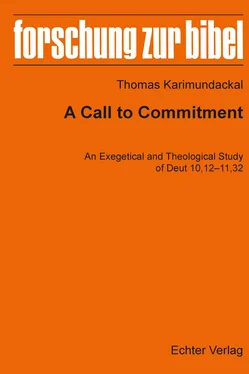4) The indefinite demonstrative pronoun, אלה in 12,1 also marks a new beginning in the Deuteronomic narrative. 21Clauses that begin with a formal asyndeton mark either a new beginning or an explication. What we have in 12,1 (אלה החקים והמשׁפטים) is a new beginning, introducing what follows and is not an explanation. 22
5) The word pair החקים והמשׁפטים functions like a superscription in 12,1 and frames the whole of chs. 12-26 by its repetition in 26,16. 23החקים והמשׁפטים in 12,1 also introduces the genre of the specific stipulations in chs. 12-26. 24
6) The use of qal perfect נתן in 12,1 in contrast to the present participle in 11,31 also suggests a new phase in the narrative. 25
7) The instruction “to observe to do the statutes and the ordinances” in 12,1 finds a conclusion in 13,1 with a similar emphasis “to observe to do” 26.את כל־הדבר אשׁר אנכי מצוה אתכם
Considering the criteria and arguments mentioned above, 11,32 closes the fifth parenesis and 12,1 introduces the specific stipulations in chs. 12-26. 27
1.3 Internal coherence of the unit
An examination of the linguistic patterns, vocabulary and rhetorical development of the text will confirm the internal unity of the textual unit (10,12-11,32).
• The internal coherence of the unit can easily be found by following the significance of the infinitive constructions introduced in 10,12-13: 10,20 ;10,12) ליראה את־יהוה אלהיך; cf. 11,25 פחד and ללכת ;(מורא 11,1.13.22 ;10,12) לאהבה אתו ;(11,22 ;10,12) בכל־דרכיו; cf. 10,15.18. 19; 11,28); לשׁמר את־מצות יהוה ;(11,13 ;10,12.20) לעבד את־יהוה אלהיך (10,13; 11,1.8.13.22.32). Thus, throughout the unit Israel is repeatedly exhorted to love, fear and serve the Lord and to walk in his ways and to keep the law. The verbal roots אהב and שׁמר are uniformly spread through all the sections of the unit: 10,12-22; 11,1-12; 13-25 and 26-32.
• The call to make a commitment “now” and “today” is one of the key motifs in the text and serves as a coherent factor in the unit (11,2.4.8.13.26.27.28.32 ;10,13.15 היום ;22 ,10,12 ועתה). Indeed, היום in 11,2 and 11,32 forms an inclusion for the entire ch. 11, and if we take the semantic meaning of ועתה and היום together, then the entire unit is framed with the same idea (10,12 and 11,32). The promulgation formula with היום is spread throughout the unit (10,13; 11,8. 13.22.27.28.32) and forms a linking thread in the unit (אשׁר אנכי מצוך אשׁר אנכי ;11,27.28 אשׁר אנכי מצוה אתכם היום ;11,8.13 ;10,13 היום 11,32 נתן לפניכם היום; cf. 11,22).
• The presence of the word pairs מצוה ,משׁפט ,חקה ,משׁמרת partly or fully in different parts of the unit makes it thematically connected and focused. While we have all these terms in 11,1, they are reduced to a generalized single term מצוה in 11.8.13.22.27 and 28. מצוה and חקה in 10,13 and חקה and משׁפט in 11,32 virtually mark the beginning and the end of the unit.
• The unit is also coherently connected with the theme of land. Although (10,14.19; 11,3.8.9.10 2x.11 2x..12.14.17.21.25.29.30.31)ארץ and (11,9.17.21)אדמה are interchangeably used to denote the land, 28the entire section is oriented to Israel’s future existence in the Promised Land. References to the Promised Land and its occupation form a running theme in chapter 11 (11,8-9.10-12.14-15.17.23-25).
• The entire unit is also firmly linked by the phrase “Yhwh your God” ( יהוה אלהיך x.10,12 3x.14.20.21.22; 11,1.12 2x.29; 10,17 יהוה אלהיכם; 11,2.13.22.25.27.28.31). The key word “heaven” (10,14.22 שׁמים; 11,11.17.21) appears in all the sections except the last one (11,26-32).
• The phrase אשׁר עשׁׂה appears frequently in the unit (10,21; 11,3.4.5. 6.7). אשׁר clauses are also uniformly spread throughout the unit and form a characteristic literary pattern in the unit (10,13.17.21 2x; 11,2 2x.3.4 2x.5.6 3x.7.8 2x.9.10 2x.11.12.13.17.21.22.24.25 2x.27.28 2x.29. 31.32).
• The unit begins, develops and ends with admonitions to keep the commandments (10,12f; 11,1.8.13.22.26-28.32). The unit begins with an exhortation to be obedient to the commandments of the Lord because of the nature of the Lord as the God of Israel (10,12-22). 11,1-7 exhort Israel to observe the commands of the Lord because he did great things for them in the past. 11,8-12 demand from Israel an adherence to the commands of the Lord as a requirement for possessing and living in the Promised Land. 11,13-21 exhort Israel to keep the commandments so that the land will be cared for and supervised by the Lord. 11,22-25 ask Israel to observe the commandments diligently so that the land will be protected by the Lord. 11,26-30 challenge Israel to keep the commands of the Lord with a choice of blessing and a curse. The unit ends with a final exhortation to observe the commandments of the Lord diligently (11,31-32).
Thus, the recurrence of the linguistic and vocabulary patterns and the successive admonitions to keep the commandments make 10,12-11,32 a rhetorical whole and confirm the internal coherence of the unit.
Conclusion
The examination of the beginning and the end of the text under consideration, as well as its internal coherence, show that 10,12-11,32 is an independent literary unit, distinguishing itself from the preceding textual unit of 9,1-10,11 and from the following 12,1-13,1. Deut 10,12-11,32 differentiates itself from the previous and the subsequent textual units with regard to time, place and theme, as well as by literary characteristics.
2. The context of Deut 10,12-11,32
As we have seen above, Deut 10,12-11,32 should be distinguished from the preceding unit (9,1-10,11) and the following unit (12,1-13,1). However, it does not mean that 10,12-11,32 is completely separated from them, instead forms a larger context. This section deals with identifying the larger context of 10,12-11,32, especially its connection with the preceding and following units.
2.1 The preceding context
Deut 9,1-10,11 is essentially a warning against Israel’s self-righteousness based on their former infidelity. In 9,1-10,11 Moses frequently emphasizes that the entry into the land and any success they might enjoy in the land are not to be interpreted as a sign of their own righteousness but due to Yhwh’s graciousness and faithfulness to his promises to the forefathers. The structure of the unit itself gives a strong warning to Israel in the wake of their preparation to enter the land and thus provides a preceding context for 10,12-11,32 as seen below.
9,1- 6: Israel’s self-righteousness and Yhwh’s grace
9,7- 10,5: Israel’s faithlessness and Yhwh’s faithfulness
9,7- 17: Golden calf - the offence
9,18-29: Moses’ intercession - catching up
10,1- 5: New Tablets - restoration of the covenant
10,6-11: Departure - resumption of the journey
2.1.1 Israel’s self-righteousness and Yhwh’s grace
The introductory verses of the unit (9,1-6) itself make it clear that the acquisition of the land ([7] ירשׁx; cf. 9,1.3.4a.4b.5a.b.6a) is not due to Israel’s righteousness ([3] צדקהx; cf. 9,4.5.6). 29Instead, Moses reminds them that the Lord will drive out the nations on account of their wickedness (רשׁעה [2x]; cf. 9,4.5; cf. Lev 18,1-30). Moses places Israel’s false claim to “righteousness” (צדקה) and the nations’ “wickedness” (רשׁעה) side by side to show that Israel can make no claim upon the occupation of the land. Israel is not judged in terms of the wickedness of these nations but according to their submission to the commandments of Yhwh. 30Therefore, Israel cannot claim righteousness but must understand that the possession of the land is solely due to Yhwh’s grace (9,4b). 31
Читать дальше












